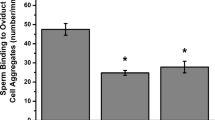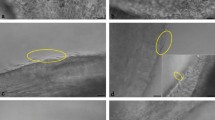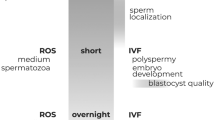Abstract
RABBIT spermatozoa must be exposed to the environment of the female tract for several hours before acquiring the capacity to fertilize ova1,2. This phenomenon was termed capacitation1, and appears to be a general requirement for fertilization in several species3,4. Chang4 later discovered that spermatozoa capacitated in utero could be decapacitated by brief incubation in seminal plasma. Decapacitation appeared to be due to a definite substance in seminal plasma5.
This is a preview of subscription content, access via your institution
Access options
Subscribe to this journal
Receive 51 print issues and online access
$199.00 per year
only $3.90 per issue
Buy this article
- Purchase on Springer Link
- Instant access to full article PDF
Prices may be subject to local taxes which are calculated during checkout
Similar content being viewed by others
References
Austin, C. R., Austral. J. Sci. Res., 4, 581 (1951).
Chang, M. C., Nature, 168, 697 (1951).
Chang, M. C., Recent Progress in the Endocrinology of Reproduction, edit. by Lloyd, C. W., 170 (Academic Press, London, 1959).
Chang, M. C., Nature, 179, 258 (1957).
Bedford, J. M., and Chang, M. C., Amer. J. Physiol., 202, 179 (1962).
Author information
Authors and Affiliations
Rights and permissions
About this article
Cite this article
WEINMAN, D., WILLIAMS, W. Mechanism of Capacitation of Rabbit Spermatozoa. Nature 203, 423–424 (1964). https://doi.org/10.1038/203423a0
Issue Date:
DOI: https://doi.org/10.1038/203423a0
This article is cited by
Comments
By submitting a comment you agree to abide by our Terms and Community Guidelines. If you find something abusive or that does not comply with our terms or guidelines please flag it as inappropriate.



